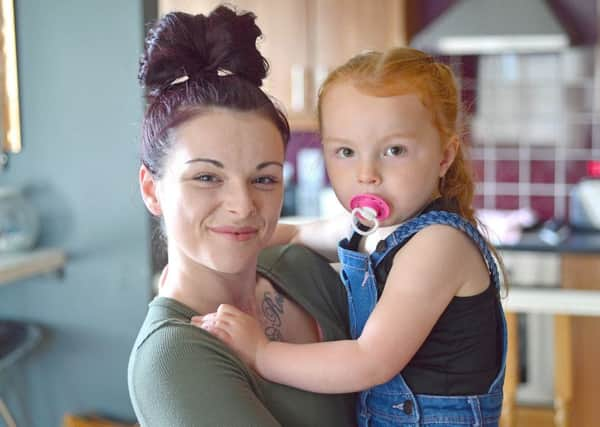Mum of Co Antrim stroke toddler hails '˜fantastic' support service


Harley Dumigan, three, from Newtownabbey, Co Antrim, was left with a brain injury as a result of a stroke when she was two and a half.
Her mother Bo Dumigan has hailed the practical and emotional support from a new Family First service as “fantastic”.
Advertisement
Hide AdAdvertisement
Hide AdShe said: “When Harley came back home after two months in hospital, I suddenly realised, ‘That’s it – we’re on our own now’.
“Harley does still attend the hospital for check-ups, but the doctors and nurses are very busy people, and they can’t be there for you every time you’re finding it difficult.
“Family First has been so fantastic. You feel they really understand what it’s like for you and they’ll go the extra mile to provide support. It’s made such a difference. I can’t thank them enough.”
It is estimated that up to 1,000 children in Northern Ireland suffer a traumatic brain injury every year.
Advertisement
Hide AdAdvertisement
Hide AdAcquired brain injuries can be due to meningitis, stroke, a brain tumour, accident or various other causes.
For some children, it can bring major changes in mobility, behaviour and ability to integrate into the school system, and can leave families feeling overwhelmed or struggling to adjust.
The Family First programme offers intensive support and aims to minimise the risk of long-term difficulties by intervening early.
It has been supported by £700,000 of National Lottery funding and is being run over five years.
Advertisement
Hide AdAdvertisement
Hide AdThe services offered to Ms Dumigan included strategies to help manage her daughter’s frustration and techniques to help cope with the fear she might have another stroke.
She added: “Harley’s stroke had a huge impact on her mobility, her ability to perform simple tasks and her personality.
“I’ve had to go back to changing nappies, dressing her, washing her and looking after her very intensively – it’s like having a new-born baby all over again, to be honest.
“And, while she used to be very sweet-natured, she now gets frustrated very easily, which does require a lot of patience to deal with.”
Advertisement
Hide AdAdvertisement
Hide AdIt is the first time such an approach, originally developed to help those with other serious health conditions, has been employed in relation to acquired brain injury.
Dr Katy Pedlow, Family First project co-ordinator, said it has the potential to save money.
She said: “By empowering families to recognise and solve problems for themselves, the Family First programme is helping to prevent many of those families from reaching crisis point.
“We certainly believe that our approach has the potential to transform the support which families affected by brain injury receive and, by preventing crises from arising in the first place, it also has the potential to help the health service to save money in the future.”
Advertisement
Hide AdAdvertisement
Hide AdThe Brain Injury Matters charity said it hoped the innovative techniques and holistic support would be adopted by health trusts and other relevant services.
For further information on the Family First service, contact the team on 028 9070 5125, or email [email protected].